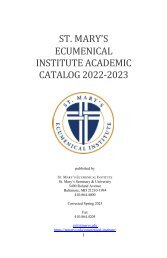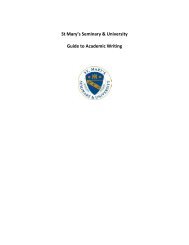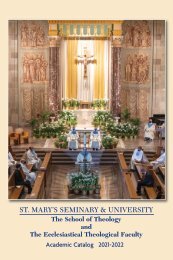EI Student Handbook 2022-2023
This Student Handbook supplements the current academic policies and procedures, which are published on our website. It also provides practical guidance for study and life within St. Mary’s Ecumenical Institute. We hope it serves as a tool of both communication and community.
This Student Handbook supplements the current academic policies and procedures, which are published on our website. It also provides practical guidance for study and life within St. Mary’s Ecumenical Institute. We hope it serves as a tool of both communication and community.
You also want an ePaper? Increase the reach of your titles
YUMPU automatically turns print PDFs into web optimized ePapers that Google loves.
All degree and certificate candidates, potential<br />
candidates, new students exploring various<br />
programs, and students who need a general<br />
introduction to theological study should take<br />
TH601 and BS600 during their first year. TH601 is<br />
required for all candidates and is a pre- or corequisite<br />
for most other courses. BS600 is required<br />
for all degree candidates and for the certificate in<br />
Biblical Studies, and it is a pre- or co-requisite for<br />
most other biblical courses.<br />
Degree-seeking students should then normally<br />
continue with foundational courses in each of the<br />
core theological disciplines. There is no magic order,<br />
but the ideal order for the first four to six courses<br />
(after TH601 and BS600) would probably be (1)<br />
biblical core (taking Hebrew Bible before New<br />
Testament); (2) H601 The Early-Medieval Christian<br />
Church before H603 Modern Church History (for<br />
the MAT.); (3) ST601 Foundations of Systematic<br />
Theology; (4) MT600 Fundamentals of<br />
Theological Ethics. Some reasons for this order<br />
include the use of the Hebrew Bible in the New<br />
Testament; the importance of the period 100-451 as<br />
a continuation of the first Christian century and a<br />
foundation for subsequent centuries; the use of<br />
Scripture and the church fathers in later (including<br />
contemporary) theology; and the foundations of<br />
moral theology in systematic theology.<br />
Many students cannot follow this precise order.<br />
Most students, however, should take these courses<br />
before taking too many others.<br />
Ministry Emphasis<br />
Candidates for the MACM choose an emphasis and<br />
take at least four courses related to that emphasis.<br />
Courses are often built on the foundation of biblical<br />
and theological work done in the core courses.<br />
Regardless of emphasis, MACM. students should<br />
take PT601 Foundations of Christian Ministry<br />
early in their program and prior to taking courses in<br />
their emphasis. Often, within an emphasis, it is<br />
advisable to take certain courses prior to others. The<br />
Director of the MACM or a student’s assigned<br />
advisor should be consulted for advice in this area.<br />
Electives<br />
For a variety of reasons, students may wish to mix<br />
some electives into their early sequence of courses.<br />
One important principle to keep in mind is that taking<br />
the core course(s) in most departments (BS, H, MT,<br />
and ST) should generally precede taking elective<br />
courses (less so in ES, PT, and SP). Although many<br />
E.I. electives are designed to be profitable for<br />
students at various levels of preparation, most<br />
students will get the most benefit from electives for<br />
which they have a foundation.<br />
Certificate-Seeking <strong>Student</strong>s<br />
Certificate-seeking students should consult with the<br />
Associate Dean for initial consultation and work<br />
closely with their assigned advisor in deciding which<br />
courses might best meet their goals.<br />
Pre- and Co-requisites<br />
There are currently two basic levels of master’s<br />
courses at the E.I.: introductory (600-level) and<br />
intermediate/advanced (700-level). Doctoral-level<br />
courses are at the 800-level.<br />
Some of the 600-level courses have one or more preor<br />
co-requisites (courses that must be taken prior to,<br />
or at the same time as, the course listed, unless<br />
special permission of the Dean is obtained). A few<br />
600-level courses do not have pre- or co-requisites.<br />
Most 700-level courses have one or more<br />
prerequisites (courses that must be taken prior to the<br />
course listed). The highest 700-level courses (790s)<br />
are advanced seminars.<br />
C.A.S. students may take certain 600-level courses<br />
at the 700-level (with additional work required) with<br />
the permission of the C.A.S. Director.<br />
Waiver of a pre- or co-requisite requires the written<br />
permission of the instructor and the Dean on a form<br />
available from the Registrar’s office. Waivers are<br />
granted only when there are compelling reasons<br />
for the request. One signature (instructor or Dean)<br />
is needed for registration, and the other must be<br />
obtained no later than the first meeting of the class<br />
to finalize the registration.<br />
17<br />
Pre-/co-requisites do not normally apply to auditors,<br />
but they may be applied at a professor’s discretion.







